Business Law Report: Case Analysis, Legislation, and Academic Policies
VerifiedAdded on 2023/05/28
|6
|867
|144
Report
AI Summary
This report provides a comprehensive analysis of the landmark case Hadley v Baxendale, exploring the legal principles of contract law and damages. It examines the court's judgment and reasoning, focusing on the implications of special circumstances and communication of such circumstances in contract breaches. The report further details the Sale of Goods legislations in Australia, listing the relevant acts from various states and territories. Finally, it outlines the Academic Misconduct Policy and Procedure, defining academic misconduct, providing examples, and detailing the consequences and appeal processes for students. The report references key legal texts and policies to support its analysis.
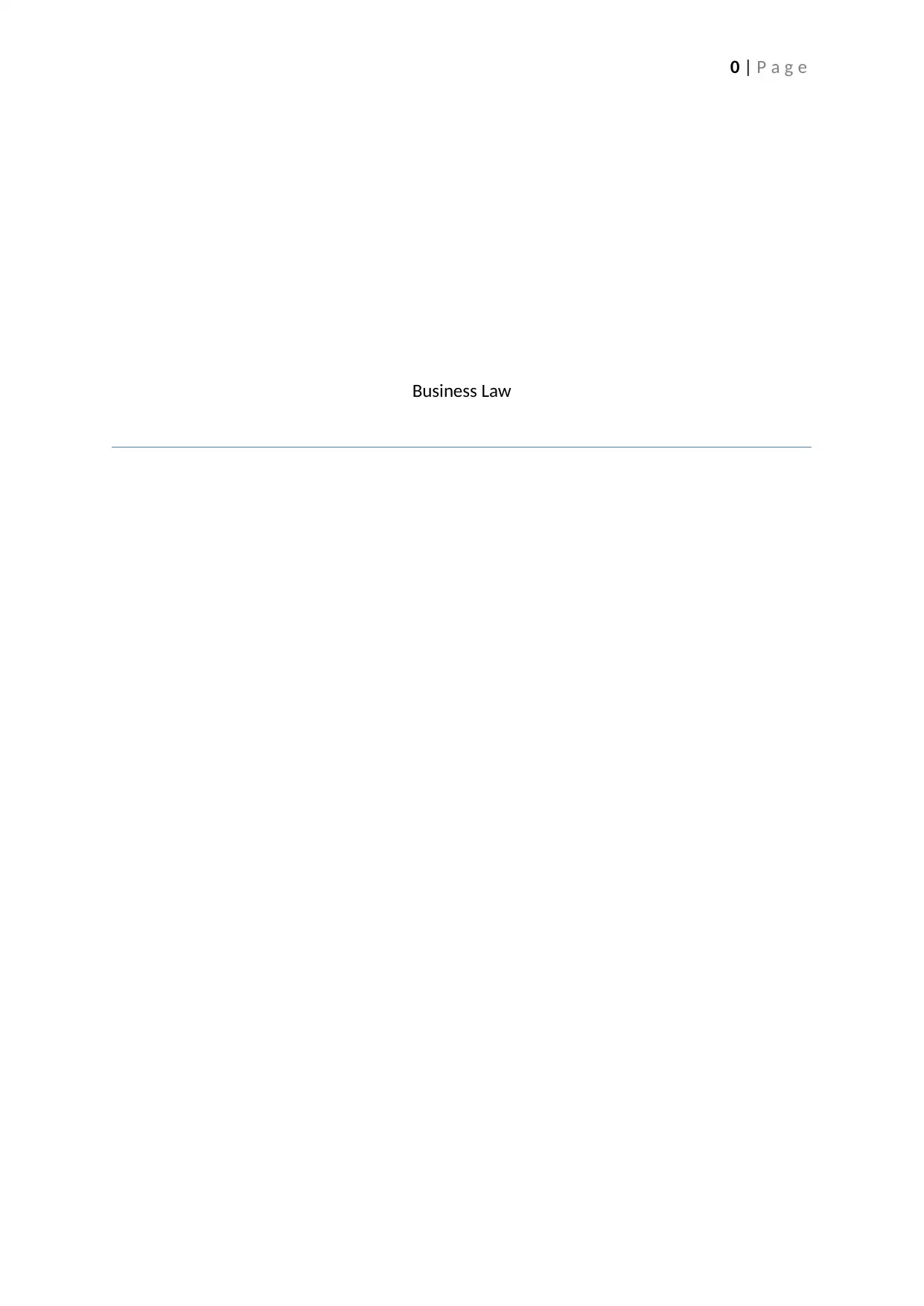
0 | P a g e
Business Law
Business Law
Paraphrase This Document
Need a fresh take? Get an instant paraphrase of this document with our AI Paraphraser
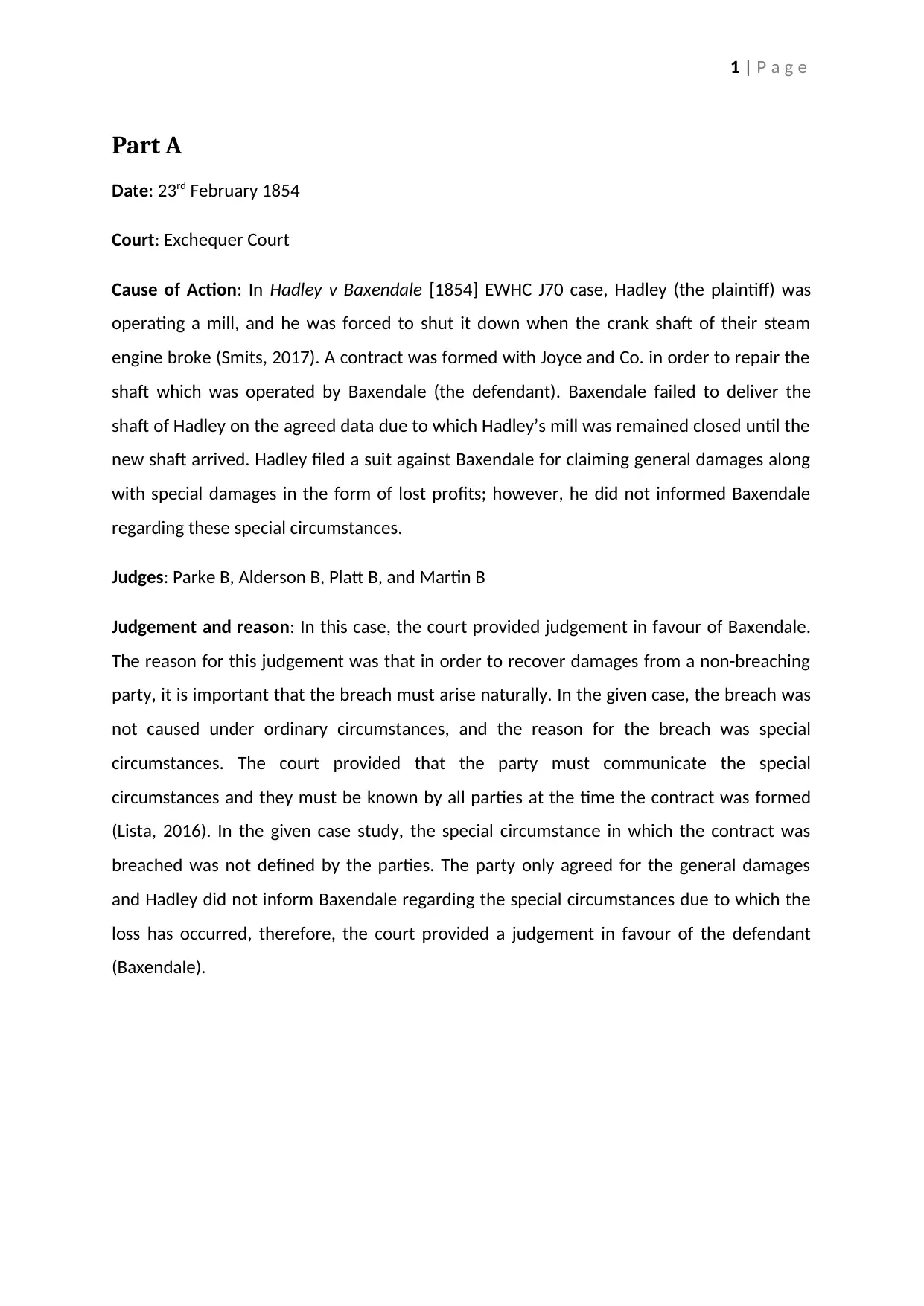
1 | P a g e
Part A
Date: 23rd February 1854
Court: Exchequer Court
Cause of Action: In Hadley v Baxendale [1854] EWHC J70 case, Hadley (the plaintiff) was
operating a mill, and he was forced to shut it down when the crank shaft of their steam
engine broke (Smits, 2017). A contract was formed with Joyce and Co. in order to repair the
shaft which was operated by Baxendale (the defendant). Baxendale failed to deliver the
shaft of Hadley on the agreed data due to which Hadley’s mill was remained closed until the
new shaft arrived. Hadley filed a suit against Baxendale for claiming general damages along
with special damages in the form of lost profits; however, he did not informed Baxendale
regarding these special circumstances.
Judges: Parke B, Alderson B, Platt B, and Martin B
Judgement and reason: In this case, the court provided judgement in favour of Baxendale.
The reason for this judgement was that in order to recover damages from a non-breaching
party, it is important that the breach must arise naturally. In the given case, the breach was
not caused under ordinary circumstances, and the reason for the breach was special
circumstances. The court provided that the party must communicate the special
circumstances and they must be known by all parties at the time the contract was formed
(Lista, 2016). In the given case study, the special circumstance in which the contract was
breached was not defined by the parties. The party only agreed for the general damages
and Hadley did not inform Baxendale regarding the special circumstances due to which the
loss has occurred, therefore, the court provided a judgement in favour of the defendant
(Baxendale).
Part A
Date: 23rd February 1854
Court: Exchequer Court
Cause of Action: In Hadley v Baxendale [1854] EWHC J70 case, Hadley (the plaintiff) was
operating a mill, and he was forced to shut it down when the crank shaft of their steam
engine broke (Smits, 2017). A contract was formed with Joyce and Co. in order to repair the
shaft which was operated by Baxendale (the defendant). Baxendale failed to deliver the
shaft of Hadley on the agreed data due to which Hadley’s mill was remained closed until the
new shaft arrived. Hadley filed a suit against Baxendale for claiming general damages along
with special damages in the form of lost profits; however, he did not informed Baxendale
regarding these special circumstances.
Judges: Parke B, Alderson B, Platt B, and Martin B
Judgement and reason: In this case, the court provided judgement in favour of Baxendale.
The reason for this judgement was that in order to recover damages from a non-breaching
party, it is important that the breach must arise naturally. In the given case, the breach was
not caused under ordinary circumstances, and the reason for the breach was special
circumstances. The court provided that the party must communicate the special
circumstances and they must be known by all parties at the time the contract was formed
(Lista, 2016). In the given case study, the special circumstance in which the contract was
breached was not defined by the parties. The party only agreed for the general damages
and Hadley did not inform Baxendale regarding the special circumstances due to which the
loss has occurred, therefore, the court provided a judgement in favour of the defendant
(Baxendale).
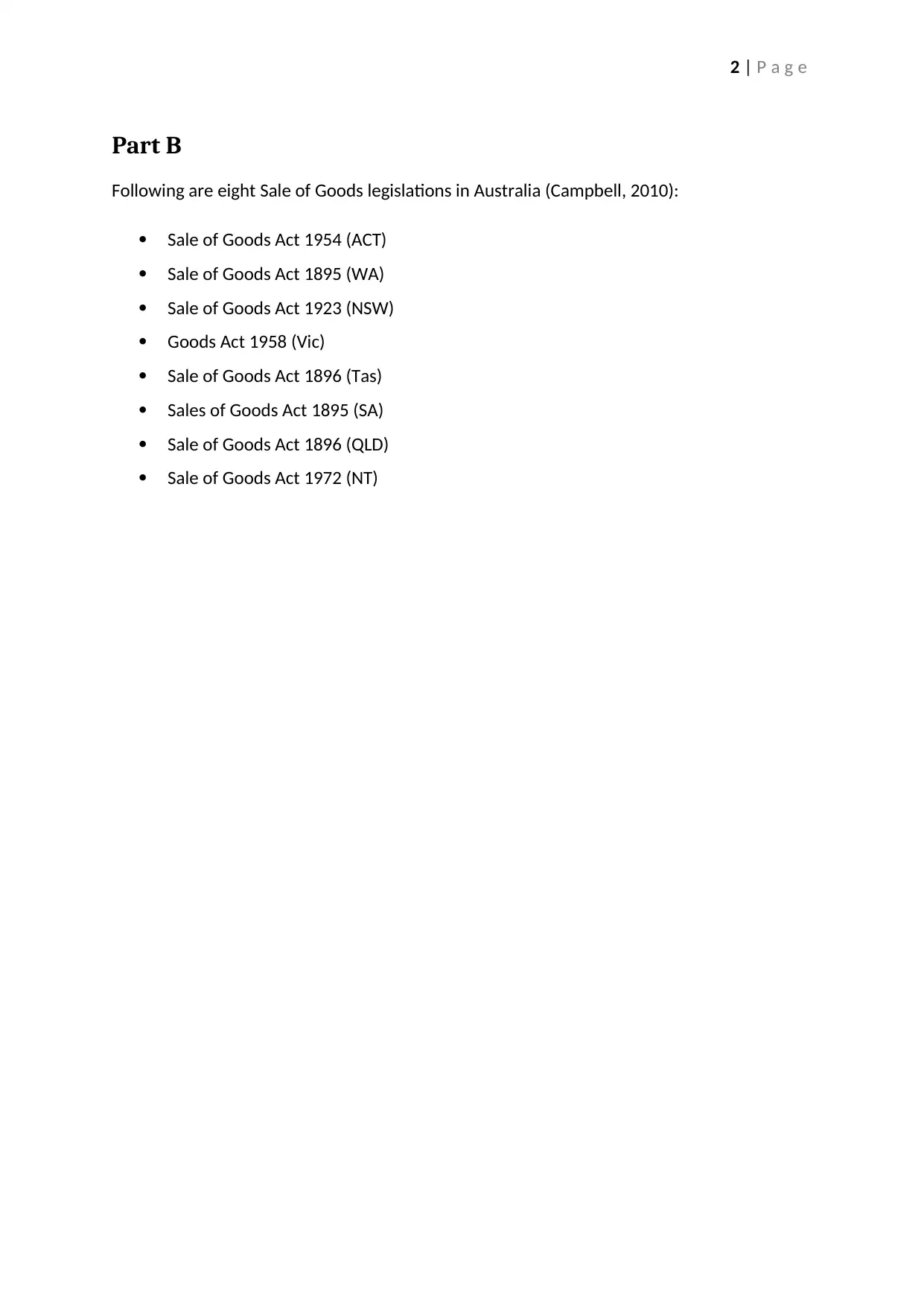
2 | P a g e
Part B
Following are eight Sale of Goods legislations in Australia (Campbell, 2010):
Sale of Goods Act 1954 (ACT)
Sale of Goods Act 1895 (WA)
Sale of Goods Act 1923 (NSW)
Goods Act 1958 (Vic)
Sale of Goods Act 1896 (Tas)
Sales of Goods Act 1895 (SA)
Sale of Goods Act 1896 (QLD)
Sale of Goods Act 1972 (NT)
Part B
Following are eight Sale of Goods legislations in Australia (Campbell, 2010):
Sale of Goods Act 1954 (ACT)
Sale of Goods Act 1895 (WA)
Sale of Goods Act 1923 (NSW)
Goods Act 1958 (Vic)
Sale of Goods Act 1896 (Tas)
Sales of Goods Act 1895 (SA)
Sale of Goods Act 1896 (QLD)
Sale of Goods Act 1972 (NT)
⊘ This is a preview!⊘
Do you want full access?
Subscribe today to unlock all pages.

Trusted by 1+ million students worldwide
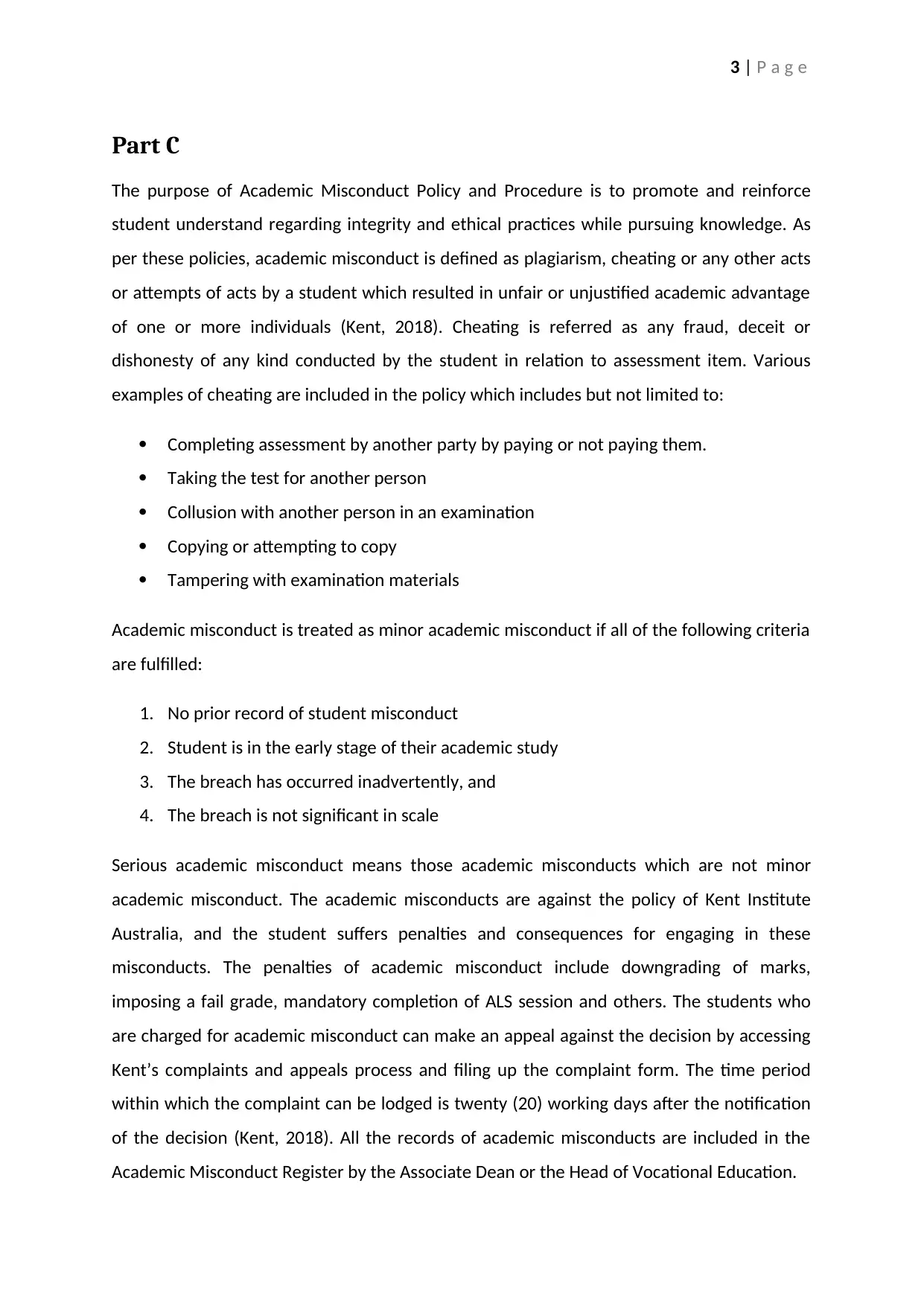
3 | P a g e
Part C
The purpose of Academic Misconduct Policy and Procedure is to promote and reinforce
student understand regarding integrity and ethical practices while pursuing knowledge. As
per these policies, academic misconduct is defined as plagiarism, cheating or any other acts
or attempts of acts by a student which resulted in unfair or unjustified academic advantage
of one or more individuals (Kent, 2018). Cheating is referred as any fraud, deceit or
dishonesty of any kind conducted by the student in relation to assessment item. Various
examples of cheating are included in the policy which includes but not limited to:
Completing assessment by another party by paying or not paying them.
Taking the test for another person
Collusion with another person in an examination
Copying or attempting to copy
Tampering with examination materials
Academic misconduct is treated as minor academic misconduct if all of the following criteria
are fulfilled:
1. No prior record of student misconduct
2. Student is in the early stage of their academic study
3. The breach has occurred inadvertently, and
4. The breach is not significant in scale
Serious academic misconduct means those academic misconducts which are not minor
academic misconduct. The academic misconducts are against the policy of Kent Institute
Australia, and the student suffers penalties and consequences for engaging in these
misconducts. The penalties of academic misconduct include downgrading of marks,
imposing a fail grade, mandatory completion of ALS session and others. The students who
are charged for academic misconduct can make an appeal against the decision by accessing
Kent’s complaints and appeals process and filing up the complaint form. The time period
within which the complaint can be lodged is twenty (20) working days after the notification
of the decision (Kent, 2018). All the records of academic misconducts are included in the
Academic Misconduct Register by the Associate Dean or the Head of Vocational Education.
Part C
The purpose of Academic Misconduct Policy and Procedure is to promote and reinforce
student understand regarding integrity and ethical practices while pursuing knowledge. As
per these policies, academic misconduct is defined as plagiarism, cheating or any other acts
or attempts of acts by a student which resulted in unfair or unjustified academic advantage
of one or more individuals (Kent, 2018). Cheating is referred as any fraud, deceit or
dishonesty of any kind conducted by the student in relation to assessment item. Various
examples of cheating are included in the policy which includes but not limited to:
Completing assessment by another party by paying or not paying them.
Taking the test for another person
Collusion with another person in an examination
Copying or attempting to copy
Tampering with examination materials
Academic misconduct is treated as minor academic misconduct if all of the following criteria
are fulfilled:
1. No prior record of student misconduct
2. Student is in the early stage of their academic study
3. The breach has occurred inadvertently, and
4. The breach is not significant in scale
Serious academic misconduct means those academic misconducts which are not minor
academic misconduct. The academic misconducts are against the policy of Kent Institute
Australia, and the student suffers penalties and consequences for engaging in these
misconducts. The penalties of academic misconduct include downgrading of marks,
imposing a fail grade, mandatory completion of ALS session and others. The students who
are charged for academic misconduct can make an appeal against the decision by accessing
Kent’s complaints and appeals process and filing up the complaint form. The time period
within which the complaint can be lodged is twenty (20) working days after the notification
of the decision (Kent, 2018). All the records of academic misconducts are included in the
Academic Misconduct Register by the Associate Dean or the Head of Vocational Education.
Paraphrase This Document
Need a fresh take? Get an instant paraphrase of this document with our AI Paraphraser

4 | P a g e
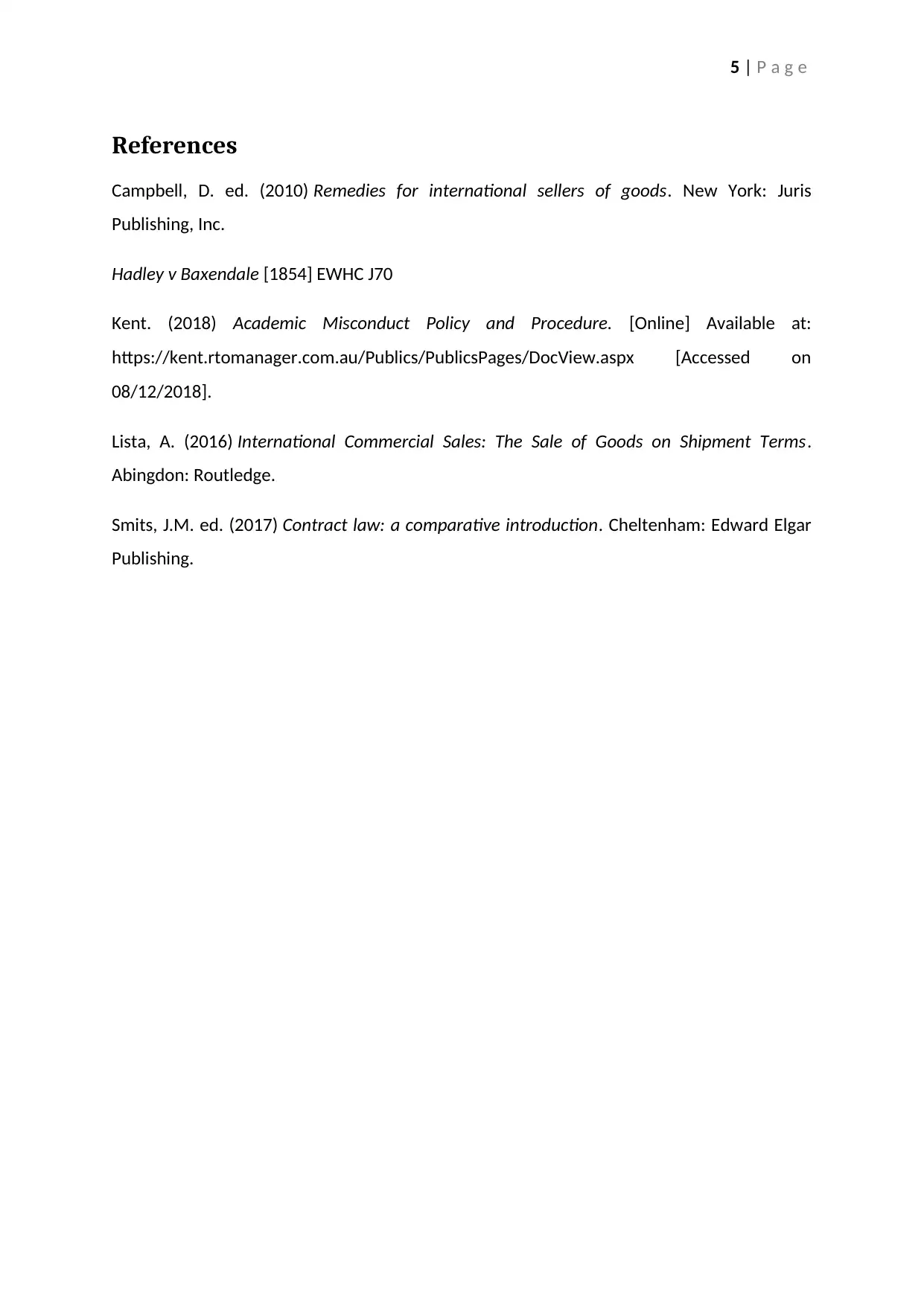
5 | P a g e
References
Campbell, D. ed. (2010) Remedies for international sellers of goods. New York: Juris
Publishing, Inc.
Hadley v Baxendale [1854] EWHC J70
Kent. (2018) Academic Misconduct Policy and Procedure. [Online] Available at:
https://kent.rtomanager.com.au/Publics/PublicsPages/DocView.aspx [Accessed on
08/12/2018].
Lista, A. (2016) International Commercial Sales: The Sale of Goods on Shipment Terms.
Abingdon: Routledge.
Smits, J.M. ed. (2017) Contract law: a comparative introduction. Cheltenham: Edward Elgar
Publishing.
References
Campbell, D. ed. (2010) Remedies for international sellers of goods. New York: Juris
Publishing, Inc.
Hadley v Baxendale [1854] EWHC J70
Kent. (2018) Academic Misconduct Policy and Procedure. [Online] Available at:
https://kent.rtomanager.com.au/Publics/PublicsPages/DocView.aspx [Accessed on
08/12/2018].
Lista, A. (2016) International Commercial Sales: The Sale of Goods on Shipment Terms.
Abingdon: Routledge.
Smits, J.M. ed. (2017) Contract law: a comparative introduction. Cheltenham: Edward Elgar
Publishing.
⊘ This is a preview!⊘
Do you want full access?
Subscribe today to unlock all pages.

Trusted by 1+ million students worldwide
1 out of 6
Related Documents
Your All-in-One AI-Powered Toolkit for Academic Success.
+13062052269
info@desklib.com
Available 24*7 on WhatsApp / Email
![[object Object]](/_next/static/media/star-bottom.7253800d.svg)
Unlock your academic potential
Copyright © 2020–2026 A2Z Services. All Rights Reserved. Developed and managed by ZUCOL.


